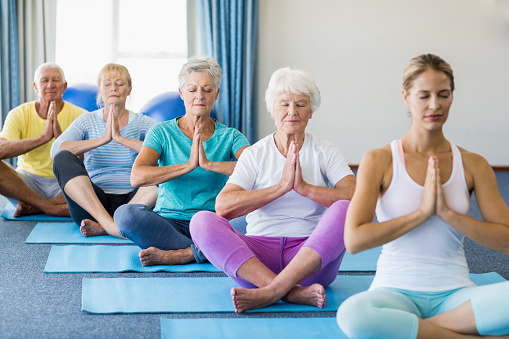Everyone Knows Someone…with Alzheimer’s or Dementia.
It’s the 21st Century and the medical community has been finding cures for a wide variety of diseases each and everyday. So why is it so hard to find a cure for Alzheimer’s?
Alzheimer’s is the most common form of dementia in the U.S. and researchers have been hard at work trying to find a cure for this disease. But until that happens, there are external protocols which have shown to be effective in helping to prevent the onset of dementia, ward off the progression of this disease and/or improve the quality of life for these patients.
Studies are being conducted and analyzed here and around the world to see the positive effects, if any, that yoga and meditation may have on an individual plagued with dementia. And the results are encouraging—a Canadian study at the University of Waterloo, suggests that “yoga and meditation may play a role in prevention and improve symptoms and quality of life for patients.” Fear, anger and depression often afflict those with dementia, and because each individual loses their cognitive ability at different rates, implementing activities that help brain function can be critical to the progression or slowing of this disease. Yoga has shown to reduce the stress that accompanies the symptoms of dementia in patients, helping them to feel less lonely and isolated. This, in effect, can help the person to have better coping skills, thus, improving their quality of life. And if practiced on a regular basis, it can improve mood function, as well. [2] [3] Yoga and Meditation disciplines can also alter brain activity—new brain connections are made through asana, chanting or pranayama (a famous breathing exercise, improving blood circulation and concentration, relaxing the mind and body that relieves stress, hypertension, and depression). In addition, studies show that meditation helps with mental processes, triggering the growth of new brain cells.[4] Caregivers can benefit greatly if they engage in yoga and meditation. Think about participating in yoga classes with your loved one with dementia. There are even yoga retreats that you go on if so desired. And as a caregiver, reducing stress levels, improving your moods and getting much needed rest, is key to being the caregiver you want to be for your loved one. This does not have to be complicated, but rather a simple, inexpensive way to either deter the onset or progression of your loved ones’ dementia. It can have a positive effect on their mind, lessen depression, confusion, anxiety and increase their overall well-being and outlook on life. [1] Yogauonline.com [2] Themindedinstitute.com [3] www.thediaryofanalzheimerscaregiver.com [4] www.alzheimers.net





